By
Goodarz Goodarzi
Early in the morning on September 7, 2009 I waited at a side door of Day General Hospital in Tehran. I had not slept the night before. I desperately needed some coffee or tea to stay awake, but it was the middle of Ramadan, the month when observant Muslims are required to fast. Even for those who don’t fast, drinking and eating is prohibited in public from sunrise to sunset.
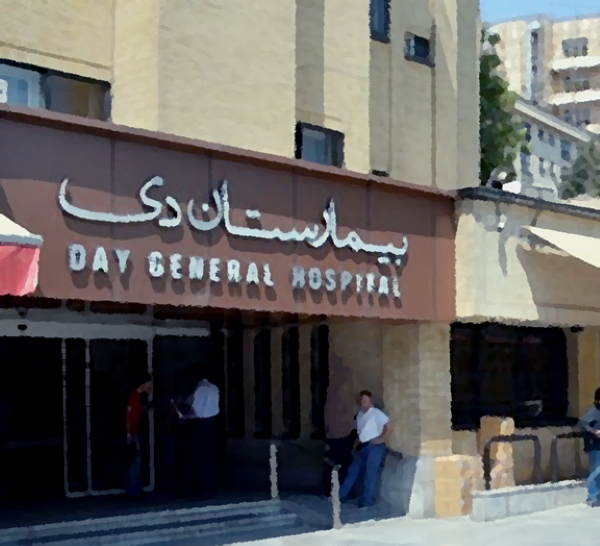
I had used the other entrances to the hospital previously many times. Those were always crowded. At this lonely door, however, I was the only one. I was waiting for an ambulance to transport my mother’s body to the cemetery for burial. She had passed away the previous evening after twelve days in a coma.
An old white ambulance pulled up. It had no lights and no siren horns. I stepped up to the driver’s window.
The driver rolled down the window, “Hello, sir, Is everything ready?”
“I don’t know.”
“Didn’t they tell you? You need to ring the bell and give the paper work to the orderly to receive the deceased.”
“They may have told me, but I don’t remember.”
I turned and walked to the door and rang the bell. An orderly appeared.
“May I have the green form?”
I gave him the piece of green paper I had received from the hospital staff. He went inside and emerged with a gurney.
As he handed me a clipboard and pen, he said, “Please sign the bottom of this form. May this be your last loss!”
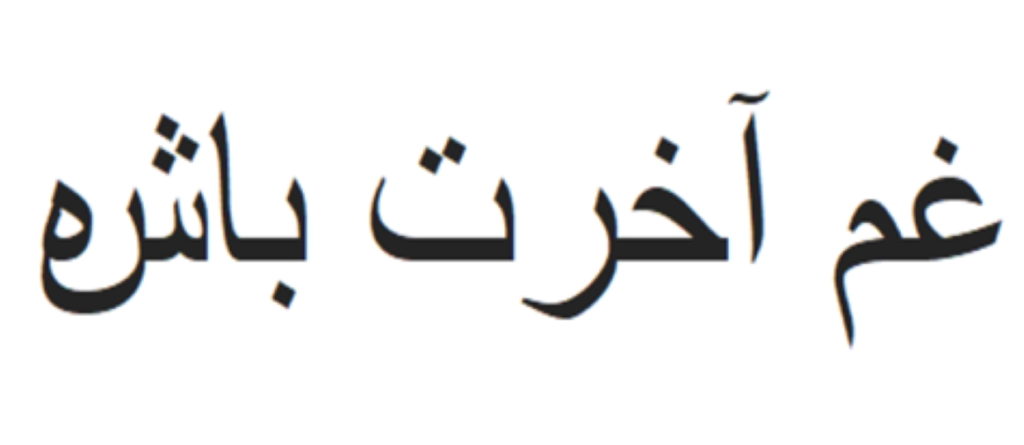
I froze in place. On the gurney lay my mother’s lifeless body, tightly wrapped in a light beige linen shroud, like a mummy. Another layer of see-through plastic was wrapped over the linen shroud and secured in place by rope around her chest, hips and ankles.
At that moment all the abstract thoughts I had about death disappeared from my mind. I felt nausea. I wanted to ask the orderly for a glass of water, but realized I could not do that. It was Ramadan. One thing I had learned while living in Iran was self-censorship, which manifests in so many forms.
Over the last four years I had done everything in my power to keep my mother alive, in part for selfish reasons. I had left my marriage, I had quit my job, and I had moved back to Iran to delay the inevitable; but it happened, and I was so unprepared to deal with my loss.
I am not sure how long I stood there before feeling a tap on my shoulder.
“We have a long drive, sir. We need to get going.”
The orderly and I lifted my mother’s body from the gurney and put it in the back of the ambulance. I tipped the orderly and got in on the passenger’s side.
“Which cemetery are we going to?” the orderly asked.
“Behesht Sakina cemetery in Karaj. Do you know how to get there?”
Behesht means heaven in Farsi and Sakina means peace and tranquility in Arabic.
“Yes sir, I do this every day, all year long. We’ll be lucky if we get there in two hours. There is a lot of traffic. How are you related to the deceased?”
“She was my mother, my only parent. My father passed away a long time ago, when I was a toddler.”
“I am very sorry for your loss. Mothers are the most precious beings on earth. I worship my mother.”
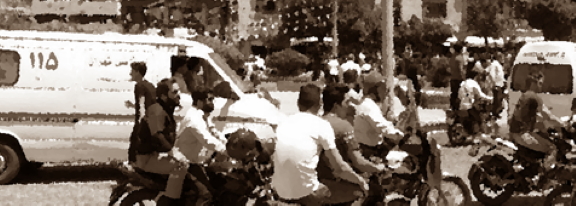
During the drive to the cemetery, I did not talk much. I let the driver, Reza, do all the talking. I learned a lot about him. He was thirty years old. He was born in 1979, the year of the Islamic Revolution in Iran. His life was defined by the Revolution, and by the eight-year bloody Iran-Iraq War of the 1980s, and by the struggles a large segment of Iranians had been dealing with ever since. He lived three hours away from Tehran in a small one-bedroom apartment with his wife, two daughters and a disabled mother, because he could not afford to live anywhere near Tehran. He had worked since he was thirteen years old and earned $130 month driving the cemetery ambulance; he could barely make ends meet. He was one of the many working poor in Iran, but there was something striking about him: he seemed very peaceful, very content.
“Are you happy with your life?” I asked him.
“Yes,” he said, “the only thing I look forward to at the end of each day is to get home after work and embrace my wife, my daughters, and my mother. In my line of work you realize life is so short. You have to be grateful for everything you have each day.”
Once we got to the cemetery gates it was anything but tranquil. There was a long line of cars trying to enter. Verses from the Koran and prayers in Arabic were blasting from loudspeakers throughout the cemetery. Fortunately, Reza knew exactly where to go. For the first stage of the Islamic burial process, Ghusl, bathing of the body, we drove up to a building that looked like an airplane hangar. There were signs stating that men and women were washed in separate areas of the building. The washing must be performed by the same gender as the deceased. There were women waiting at the entrance to receive the bodies with gurneys. The women wore dark uniforms covering their whole body, with black hijab, head scarves, covering their hair, black PVC rain boots and black thick long latex rubber gloves. As Reza got out of the car, one of the women pushed a gurney towards the back of the ambulance. Reza opened the back door and stood there. This was my first time going through the burial process in a cemetery in Iran. I was overwhelmed and was taking my time getting out of the ambulance. Before long the women said, “If you want your deceased processed quickly you need to hurry.”
I stood behind the ambulance, waiting. I thought Reza was going to help her move my mother’s body from the ambulance to the gurney. He saw my confusion, “Sir, I am sorry but I cannot touch a Na-Mahram women.”
In Islam, a man is allowed to have physical or visual interactions with only certain categories of women such as some of his blood kin, his spouse, and his daughters. Na-Mahram women are females a man is not allowed to touch or see without a hijab.
I had not realized that Reza was such an observant Muslim.
I went inside the ambulance and with the help of the women lifted my mother’s body onto the gurney. Then I tipped Reza and shook his hand. As he walked away, his last words were, “I am certain your mother is in heaven. May this be your last loss.”
One of the women pushing the gurney noticed that I was overwhelmed. She asked, “Have you purchased your grave? Is all your paperwork ready?”
“No.”
“You need to get all that straightened out at the office before they will allow you to bury the body. Washing of the body will take about an hour. You must rush to the office now and get these things done.”
She and the body disappeared into the hangar. I hurried toward the office. As I was walking, I saw throngs of distraught people dressed in black wandering around the cemetery. From the corner of my eyes, I noticed a middle-aged woman in a black veil, on the ground, wailing and slapping herself on her head and face, while her family members tried to comfort her. The atmosphere in the cemetery did not reflect its name. The temperature already felt in triple digits, and I was thirstier. I ran my tongue around my dried lips and rubbed them together.
As I got closer to the office, I noticed some family members waiting. A contingent had arrived on a bus for the burial. A third cousin, Azizollah, approached me and put his hand on my shoulder, “I already talked to one of the clerks. He is an acquaintance of mine. I asked him to hold a good spot for you. I even haggled and got a discount. Don’t pay more than two million and four hundred thousand Tomans (approximately $2400).”
In Iran, even in a cemetery, having connections opens doors and makes life easier. And you have to remember to haggle, no matter what you are buying, even if it’s a grave.
We had to wait in line for a few minutes, and every minute felt like an eternity. When it was my turn, I walked up to the counter, put the paperwork in front of the clerk, and said, “Hello, sir, I need to purchase a grave for my mother.”
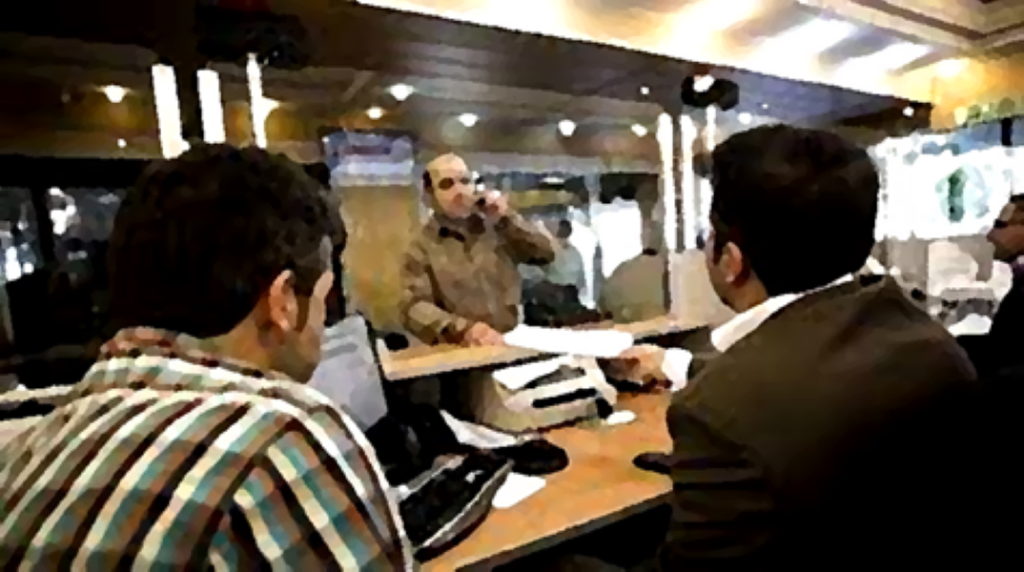
As he took the papers, he replied, “May this be your last loss.” He flipped the death certificate from the hospital over, glanced at it and put it back on the counter. “The signature of the attending physician is missing,” he said, pushing the document toward me. “We cannot bury the deceased until the paperwork is complete.”
I flipped the document over and pointed to the signature of the physician at the bottom. “He signed the certificate.”
He flipped it back over and pointed to a blank signature spot. “A second signature by the same physician is required.”
“Can you please let me bury my mother, she is being washed as we speak. What am I to do now? It will take me five hours to go to the Tehran, get the signature, and come back. Do you close for noon prayers?”
“Yes, you can come back tomorrow.”
“What am I supposed to do with my mother’s body? I have a bus load of family members here from Tehran and Mazandaran. Can you please be so kind and process the paperwork? I will get the signature later today and come back tomorrow. I will give you my word.”
In the Iran of the old days, your word and a handshake were enough to get you out of a bind, but in the years since the revolution that code of conduct was no longer prevalent.
Azizollah, who was standing right behind me, interjected, “Brother, I will vouch for him. He is not from here, he comes from America. They are not used to our paperwork process.”
After the revolution, in keeping with religious guidelines, people would call each other brother or sister rather than Mr. or Mrs.
I did not appreciate Azizollah’s backhanded comment. I already felt like a foreigner in my own country. I did not feel it was necessary for him to verbalize it.
The clerk looked at him and then looked at me.” You can proceed with the burial, but if you don’t get the additional signature by tomorrow, we will not allow you to put up a grave stone.”
Azizollah jumped in to say, “Your colleague has set aside a grave for us”
The clerk stepped away to talk to one of his co-workers and came back, “Section 12, row 6 grave 21, in one of our older prime lots. You had agreed to 2.4 million with my colleague.”
I handed him the money. “Thank you. That is fine. That is very kind of you. May God bless you.” He counted the bills, stamped my paperwork and handed it to me. “I will call in, to have the grave ready for you.”
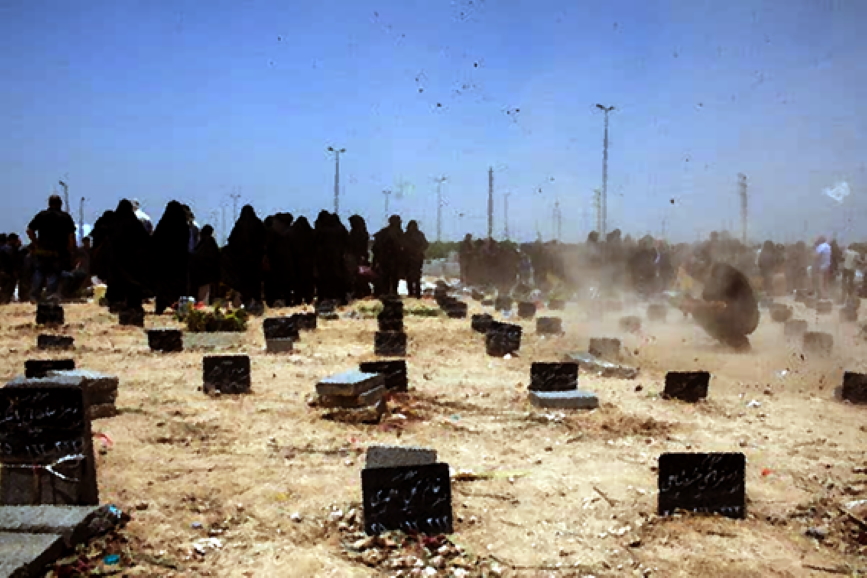
We rushed out of the office towards the morgue. When I entered the big hall where bodies ready for burial were discharged, I saw my family members huddled around. In the hall, there were another dozen huddles of people. Once I got closer, I saw an open plain wooden casket with handles. My mother’s body was inside, wrapped in a kafan, a burial shroud.
“Why is the casket open?” I asked.
“It is just for carrying the body to the grave,” a family member responded.
Suddenly a cleric rushed up to the casket and started praying rapidly.
“What is he doing?” I whispered to my uncle, who was standing next to me.
“He is performing the burial prayers and saying a fatiha.”
The Fatiha is the opening chapter of the Quran.
“I really don’t like this process,” I blurted out. “I wish I could cremate my mother.”
Rosie, my mother’s friend since her nursing school days, grabbed my arm. “Are you insane,” she whispered. “It is blasphemous to utter such nonsense. Your mother was a Muslim, she must be buried according to Islamic rules. Do you want to be prosecuted by the Revolutionary Court? Do you know where you are? You are in the Islamic Republic. You must be feeling unwell, to say such things.”
I was surprised to hear these words from Rosie, who was western-educated and came from an upper-class background. Thoughts swirled in my head. I didn’t have the energy to form them into sentences. “These rituals have nothing to do with Islam, and even if they did, so what? Thirty years have passed since the Revolution. Why do we still have a Revolutionary Court? Why would they care what I want to do with my mother’s body?”
The cleric was done praying. “Pay him a gratuity,” my uncle said.
I gave him two ten-thousand Toman bills, about 20 dollars, and he quickly walked towards the next huddle.
Azizollah called out for five male family members to lift and carry the casket. “Goodarz Khan,” he said, “you need to be in front on the right.” It is customary for the body to be carried to the grave on the shoulders of the closest male family members.
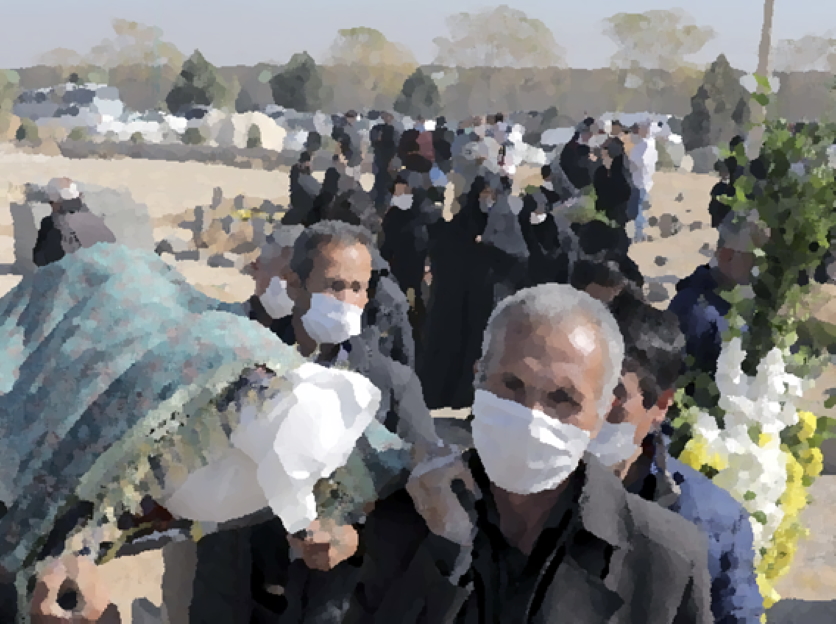
As we exited the hall with the casket on our shoulders and family and friends behind us, everyone broke out chanting the Shahadat,” the first pillar of Islam, testifying to the oneness of God. “La ʾIlaha ʾill Allah,” they chanted. There is no God but God.
“You need to chant also,” one of the cousins carrying the casket told me.
I had no desire to chant the Shahadat at that moment. Having lost the most important person in my life, I thought there was no God, period.
I started mumbling the chant, butchering it, just so I would be left alone. The grave was half a mile away, and I had made the mistake of wearing a dark gray wool suit, the only dark suit I had. By the time we got to the grave, the chanting and the heat had made me dizzy. The two grave diggers were just finishing digging. They climbed out and I thought they were going to take the body and lower it into the grave. Instead, I was surprised to see, they walk a few steps back and stood behind the crowd
My cousin Baharak approached me from behind. “You must go in the grave now,” she whispered.
“What? What do you mean?”
“You must go in. They will hand you the body, you will lay it on the floor of the grave. You have to open the shroud and tilt your mother’s head toward Mecca. Then put the slab of rock you see by the side of the grave at a 45-degree angle over her head, so when they throw dirt back in to fill the grave, it doesn’t hit her face and head directly.”
“Are you serious?”
“Yes. You did not know that?”
“No, of course not. I have never been to a burial in Iran.”
“The closest male family member must perform this ritual. Go in, we are here to support you. “
I took off my jacket, sat on the side of the grave with feet dangling and jumped in.
The grave was deeper than I had thought. Once inside, I stood up. My head was at ground level. The grave was very narrow. I could touch both sides if I stretched out my arms. I felt claustrophobic. I couldn’t breathe.
Someone from above said, “Breath, take a few deep breaths. Tell us when you are ready.”
I felt a breeze on my face. It was much cooler in the grave than it was above. Soft roots of plants and vegetation were sticking out from all sides and earth worms were crawling on the floor of the grave. For a few moments I was transported to a different place; it felt more peaceful inside the grave than above the ground. A loud voice interrupted my otherworldly state. I looked up and saw that two of my family members had lifted my mother’s body out of the casket and were lowering it into the grave toward me.
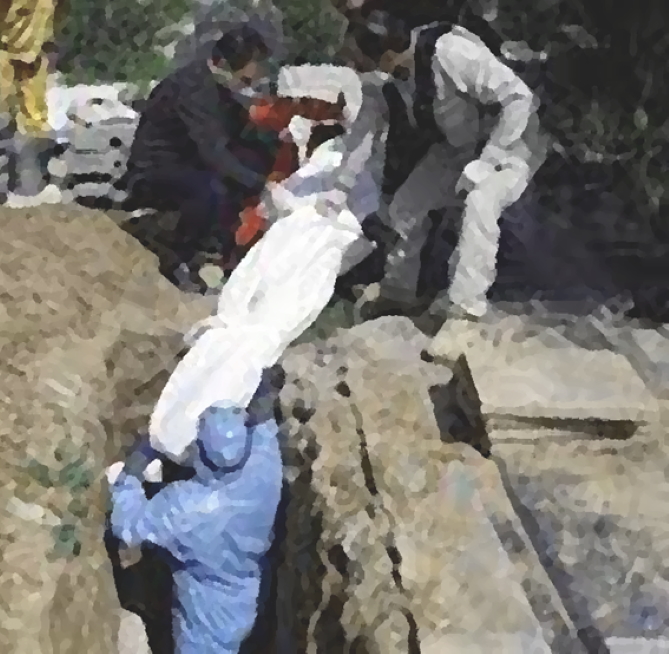
“Go to the middle and hold your arms out,” I heard a voice say.
I took a couple of steps sideways and stretched out my arms. Then I felt the weight of my mother’s body on my arms. Her body pushed me back and pinned me to the side wall of the grave. I was losing my balance and did everything I could not to drop the body. The grave was so narrow, I couldn’t bend down and put the body on the floor of the grave. With my back against the wall of the grave, I slid slowly down to a squat. The side wall was rough on my back, it felt like a pumice stone. Gently, I released the body and thankfully it did not roll over.
“Open the shroud and turn her head to the right. Take this slab, put it over your mother’s head at an angle,” another voice ordered.
I stood up, I took the square cement slab, and I set it against the wall of the grave. I squatted down and started to pull back the shroud. The moment I saw my mother’s lifeless face, my heart began to pound with anxiety. I looked up for a moment to breathe but I could not. My head was spinning. I was dizzy, I felt sick to my stomach.
“I cannot do this; I am getting sick. I need to get out please. I need to get out for a moment. Please help me get out.”
“Stay in, you have one more thing to do, stay in,” someone said from above ground.
“I can’t, I can’t breathe. Please help me get out.”
I tried to stand up but felt dizzy. I put my hands against the wall and barely pulled myself up. Everything was spinning around me. I felt the walls closing in on me.
“Help him, help him, pull him out, he is fainting,” someone yelled. I think it was cousin Baharak.
“Grab my hands,” another voice said. Two hands came in from the side of the wall that I was leaning on. I lifted my hands up and felt a grip. That was the last thing I remember from inside the grave.
When I opened my eyes, everything was blurry. I was lying flat on my back. I felt water splashing on my face and heat from rays of sunshine on my face. Several people were huddled around, looking down at me.
“Can you hear me? Give him some water.”
A hand behind my neck helped bring my head up. Someone put an open bottle of water to my lips. I started drinking, forgetting that it was Ramadan: at that moment I didn’t care.
I looked all around. “Where am I?”
“We are burying your mother. You passed out,” one of the people in the huddle replied. I turned my head and out of the corner of my eyes, I saw my third cousin, Azizollah, in the grave finishing what I was unable to do.
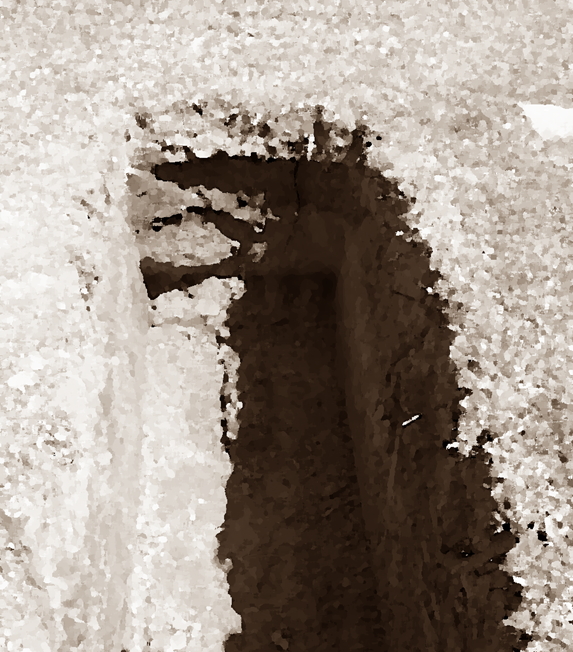
After a few moments, people helped me stand up, but I still felt dizzy. Azizollah came out of the grave. The grave diggers moved forward then and started to shovel dirt over my mother’s body. I stood silently, tears rolling down my face. I felt as if a part of me had stayed in that grave. Pretty soon her body disappeared from sight. We waited until the grave was filled with dirt. The crowd quietly walked back to the bus bound for Tehran.
The tradition is to take the people who attended the burial to lunch. But thanks to Ramadan, I had an excuse not to. It was early afternoon, and all the restaurants were closed. During Ramadan, you can break your fast and eat after sunset.
When we had boarded the bus, I stood up in front. “I want to express my gratitude to all of you for attending my mother’s burial. I apologize, but due to Ramada, we are unable to have lunch together. I hope you will join us at the khatm services.” The khatm, which literally translates to finale or conclusion, is the memorial service which has to be held within three days of the burial.
I went to the back of the bus and sat in the corner wanting alone-time, but one by one people came by to express again their condolences.

I had two questions running through my mind in the brief moments between thanking people. One was a short-term question. How was I going to put together a respectable khatm services for my mother? But for help with this question, I knew I could rely on my cousin Baharak. She was like a sister to me and very resourceful.
My other question was more long-term. What to do with my life? For thirty-one years, ever since I was twelve years old and my father died, being a dutiful son had given me a purpose in life. My priority had always been to take care of my mother’s needs first and lessen her suffering. Now I had to figure out how to live my life without her, and I had no one to go to for help.
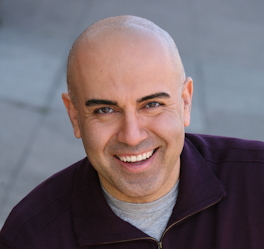
Goodarz Goodarzi was born and raised in Iran and lived through the 1979 Islamic Revolution as a boy. He left Iran in the mid-eighties to escape a draft that would have sent him to fight in the Iran-Iraq war. Today, he lives in Northern California but has visited Iran sporadically over the years. He is currently at work on a memoir, The Dutiful Son and the General’s Daughter, the epic of his family, an aristocratic land-owning dynasty who ruled a small principality in Northern Iran at the beginning of the 20th century, and whose scion, Goodarz himself, ended up as a homeless young man in the streets of Boston in the late nineteen eighties.
Copyright 2021 by Goodarz Goodarzi: All rights reserved.